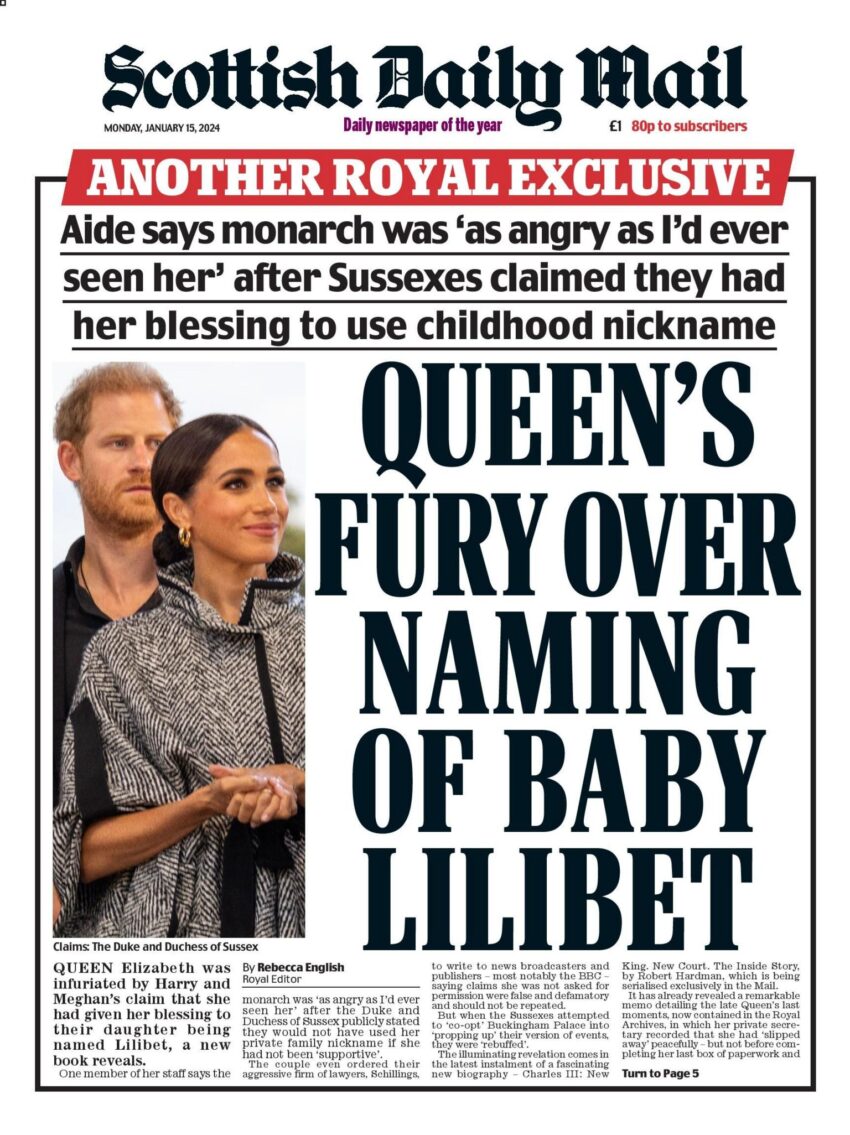In a shocking revelation from Robert Hardman’s new biography, “Charles III, New King, New Court, The Inside Story,” it has been disclosed that the late Queen Elizabeth was furious when Prince Harry and Meghan Markle publicly claimed that she had given her blessing to name their daughter Lilibet.
The book, serialized in the Daily Mail, exposes the monarch’s anger towards the Sussexes’ comments.
The couple announced in 2021 that they had chosen to name their second child Lilibet, after the famous family nickname of the late Queen.
This endearing name originated during the monarch’s childhood when she was just a toddler and struggled to pronounce her own name.
However, according to a Palace Insider, the couple’s assertion that the Queen had supported their choice left her seething with anger.
Contrary to Harry and Meghan’s claims, the BBC reported at the time that the Queen had not been consulted or asked for her blessing regarding the name.
While some reports suggest that the Queen was indeed contacted by her grandson, she was not in a position to refuse.
Nevertheless, a spokesperson for the Duke and Duchess vehemently denied these claims, stating that they would not have used the name if the Queen had not been supportive.
The spokesperson emphasized that the Duke had spoken with his family prior to the announcement, with his grandmother being the first family member he called, expressing their desire to honor her by naming their daughter Lilibet.
To counter the allegations, the Duke and Duchess’s law firm, Shillings, sent a letter to certain news broadcasters and publishers, asserting that the claims of not seeking the Queen’s permission were false and defamatory.
Commenting on the situation, Hardman noted that one individual recalled the Queen’s anger at the announcement, as Lilibet was her childhood nickname.
He further added that the couple promptly issued warnings of legal action against anyone who dared to suggest otherwise, including the BBC.
However, when the Sussexes attempted to involve the palace in supporting their version of events, they were met with resistance.
It became a matter of differing recollections.
It is evident that Queen Elizabeth saw through Meghan Markle’s intentions.
The couple’s behavior has been presumptuous from the start, wanting to distance themselves from the royal family while simultaneously seeking inclusion.
One would assume that having a grandchild named after oneself would be a touching and honorable gesture.
However, Queen Elizabeth understood Meghan’s ulterior motives.
It is clear that Meghan intended to capitalize on the name for financial gain.
While the Queen had no objections to it being used as a middle name, Meghan insisted on it being the first name.
It is evident that if permission was granted, it was for the use of Elizabeth, not Lilibet.
Meghan conceived the idea, and Harry, who should have known better, acquiesced, obedient as ever.
The poor Queen dedicated her entire life to serving others, and her nickname was one of the few things that remained truly personal and private to her.
It also held sentimental value, serving as a connection to her beloved family, including a sister who affectionately called her by that name, and her parents who adopted it.
To have that taken away from her is undeniably cruel.
The Queen was well aware that this was not a genuine tribute, but rather a ploy for attention and merchandise.
In conclusion, the revelation of Queen Elizabeth’s outrage at Harry and Meghan’s naming of Lilibet without her approval has shed light on the strained relationship between the Sussexes and the royal family.
The book exposes the Queen’s anger and the subsequent legal actions taken by the couple to defend their claims.
